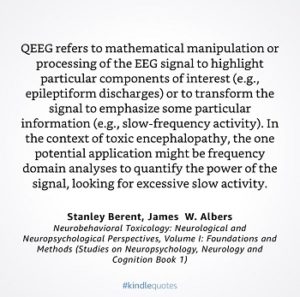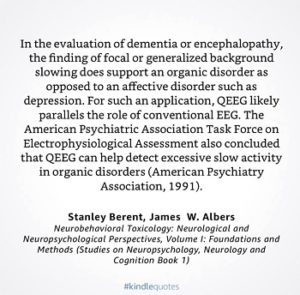I was prescribed Lexapro due to some work-related stress and took it for years without any knowledge of the ill effects to my brain. As a consequence of the Lexapro, I developed a number of neurological symptoms that resulted in diminished neurocognitive and physical capacity. The doctors call this toxic encephalopathy – drug induced brain damage. My primary symptoms continue to be significant cognitive and short-term memory decline, headache, pain, weakness, and balance/coordination issues. Seven years after the last pill these same symptoms persist. I have written about my experience (with the help of the HM editor) here, and here. Many have inquired on this blog or directly for an update on my case. My medical condition has not changed. However, since my last updates, it has been even further defined by additional medical experts who have weighed in on my case.
Experts Continue To Confirm Toxic Encephalopathy
Nuclear Medicine Specialist/Radiologist-2020
“This is a markedly abnormal brain SPECT indicating an advanced encephalopathy for which possible etiologies encompass a congruence of multiple possible factors including some or all of: vascular, neurotoxic (prolonged/extensive exposure to drugs, toxic substances, mold or iatrogenic effects) closed head injuries (multiple, cumulative), sleep problems, inflammation, anoxia, and neuro-vegetative dysfunctions.”
Neuropharmacologist-2021
“In conclusion, I can state with a significant degree of pharmacological certainty that the long term treatment with escitalopram/trazadone produced changes in Mr. CF’s brain responsible for reduction in the functions he has exhibited in the years following that exposure. This is based on the following:
- Symptoms are consistent with the side effects seen with these drugs.
- The removal of the drug with symptom reduction and its reinstatement in 2015 with a return of symptoms speaks strongly to a toxic encephalopathy.
- The literature is clear that although rare, toxic encephalopathy does occur and can be life-altering.
- The fact that Mr. CF is a slow metabolizer of the drug suggests that his chronic dosing was likely higher than normal consistent with a toxic encephalopathy, although this encephalopathy can occur with normal metabolism as well.”
Neurologist expert #1 -2021
“Encephalopathy is a broad term that applies to brain dysfunction due to factors outside of the nervous system, such as systemic illness, trauma, metabolic disturbances, environmental exposures and drugs/medications. Symptoms include cognitive dysfunction, incoordination of movements, weakness, difficulty walking, problems with vision and speech. While symptoms can mimic stroke, neuroimaging can be useful in refuting cerebrovascular insult. Neurophysiological testing is often used to clarify and prognosticate cerebral dysfunction.
The claimant’s symptomatology and testing results corroborate encephalopathy as the leading clinical diagnosis. Specifically referring to drug-induced encephalopathy, any genetic polymorphism may influence the metabolism, excretion or action of the drug depending on single or multiple genes or by changes in gene expression. The claimant was proven to have slower metabolism of psychotropic medications (e.g., genetic pleomorphisms in CYP2C19, CYP2D6, and CYP3A4). The long-term effects of toxic levels of Lexapro and/or Trazadone predisposed him to encephalopathy.”
Neurologist expert #2 -2021
“CF’s case clearly demonstrates the importance of understanding medication half-life, CYP450 interactions in the development of medication toxicity, and an individual’s pharmacogenetics disposition. Genetic cytochrome P450 testing revealed that CF was found to have problems with his serotonin transporter gene SLC6A4 as well as reduced enzymatic activity of both CYP2D6 and CYP2C9 enzymes. Without question, his long-term exposure to long acting serotonergic medications has caused irreversible and permanent brain injury (toxic encephalopathy).”
QEEG PhD expert-2022 (after review of two QEEG’s performed in 2021)
“SUMMARY: swLORETA source level analyses were significantly deviant from normal and findings between time 1 and time 2 were highly consistent. In particular, in both recordings there were elevated current sources in the Theta band were present in the same regions of the bi-lateral frontal lobe, especially in the medial and superior supplementary motor areas and the prefrontal cortex. The location of abnormality is given primary importance for linking regional brain dysregulation to neurological symptoms, but the frequency band provides an added layer of information.
With regard to frequency interpretation, encephalographic patterns in CF’s brain activation were characterized by abnormal rhythms in the theta band and generalized slowing of the EEG. This is a common finding in patients with metabolic and toxic encephalopathy.
swLORETA connectivity analyses were deviant from normal, characterized by widespread hyperconnectivity within neurocognitive networks that play a major role in cognition, emotion, somatosensory, motor movement, vestibular, and autonomic functions. Hyperconnectivity is considered to be a primary compensatory response to neuronal injury with behavioral consequences from reduced processing speed and cognitive fatigue from added redundancy.
CF’s hyperconnectivity patterns were still present at time 2, including network connections to and from the cerebellum which play a vital role in finite motor sequencing, vestibular balance, and cognitive executive functions (e.g., attention). These connectivity results implicate white matter tracts which include the corpus callosum, cingulum, and superior longitudinal fasciculus.
Mr. CF’s symptoms of executive dysfunction, chronic pain, headache, and fatigue may be explained by dysregulation involving these tract which connect 1) the frontal lobe (executive functioning, working memory, abstract thinking, motor control, expressive language, sequential planning, emotional regulation, and social skills), 2) the temporal lobes (auditory information processing, short-term memory, memory consolidation, and receptive language), 3) the parietal lobes (somatosensory processing, spatial information processing, proprioception, executive attention, receptive language, empathy control, and awareness of emotional expression) and 4) the occipital lobes (visual processing of color, form, movement, visual perception, and visual- spatial processing). The global extent of these abnormal electrical patterns found is consistent with Mr. CF’s severe limitations and impairments.
Together with abnormalities documented in his medical records, this qEEG record provides clear, objective, and overwhelming evidence of severe disability consistent with toxic encephalopathy.”
Psychiatrist, neuropharmacology and epidemiology expert- 2022
“In conclusion, it now appears that Mr. CF is suffering from a constellation of symptoms, severe enough to impair daily functioning. Regardless of the terminology which professionals may employ in diagnosing his condition – chronic toxic encephalopathy, Parkinsonism with dementia, or dementia due to multiple etiologies – it is with a high degree of certainty that antidepressant medications were the essential and causal agents of his disability.“
Neuropsychologist-2022
“In summary, the results of the neuropsychological re-testing (performed in late 2021) are consistent with Mr. CF’s symptoms, the diagnostic interview, interviews of witnesses, the medical records, including the claimant’s treating doctors and expert consultants, and my prior evaluations.
My diagnosis of the claimant remains the same as found in my prior reports of March 2, 2018 and May 14, 2020: Toxic Encephalopathy (ICD 10 G92) (a brain injury from prescribed drug); DSM-5 Substance/Medication Induced Major Neurocognitive Disorder (ICD F13.97).
The medical record, including brain imaging and QEEG abnormalities reported previously and above, support the diagnosis of Toxic Encephalopathy and Substance/Medication Induced Major Neurocognitive Disorder. Note the concordance of the above-referenced specific qEEG abnormalities and the report of symptoms and the neuropsychological test results. SPECT scans also are interpreted as showing abnormalities in areas that support neuropsychological functions. These abnormalities support the opinion of an enduring brain injury resulting in long-term disability. This condition cannot be treated to remission by methods as standardly accepted in the practice of neuropsychology or medicine.”
In addition to all of this, I had a recent brain MRI showing white matter lesions in the same location as was in my 2017 brain MRI.
Final Thoughts
It seems like ages ago that doctors initially rejected my claims of the medication causing the decline in my health. My conditions/diagnoses described above are now being treated holistically with good care/support by a neurologist, a neuropsychiatrist and internal medicine specialist. However, it still irks me today that I had to go through all of this to prove myself. Doctors should remember their loyalty should be more aligned with their patients and not the pharmaceutical companies.
We Need Your Help
More people than ever are reading Hormones Matter, a testament to the need for independent voices in health and medicine. We are not funded and accept limited advertising. Unlike many health sites, we don’t force you to purchase a subscription. We believe health information should be open to all. If you read Hormones Matter, like it, please help support it. Contribute now.














CF, after you stopped the Lexapro, did you try any other SSRIs or SNRIs? Did they help at all?
Sarah, did you comprehend the article? Because I’m having a difficult time comprehending why on earth taking another antidepressant would improve brain damage caused by another antidepressant?
It will never cease to amaze me how many people hear about a class of drugs causing this amount of iatrogenic harm and then having the audacity to ask if you would try to risk your life again by taking the same class of drugs. Some people never learn. BigPharma loves people like Sarah lol
Kelli,
Thanks for chiming in. Yes, they are everywhere!
I’m trying to get off Effexor after 25 years of use! 37.5 mg! The drug is destroyed me! I’m 60 years old! I’ve started a taper but not going well not sure when I can just stop it. I have no Dr helping me!
What doctor would I go to if I am experiencing the same symptoms ??
Have you seen any improvements?
I am sure that is what I got, too. May I ask you are taking/doing now to help your condition?
I have been off paxil for 10 years. Still disabled with over 40+ symptoms keeping me from living any sort of a normal life. I think im suffering from this also. Struggling to get diagnosed, but even so, nothing can be done regardless. I am now 34 years old. 10 years of my prime years gone.
Happened to me to 11 years I’m off Seroxat which is paxil still have symptoms every day feel free to message me
Feel free to email me. Im almost 12 years off and suffering severely.
My email address is iwontgiveuphope (at) gmail .com
Hi there, I’m so sorry to read this. I also struggled a lot on antidepressants and developed a severe leg nerve pain on them, still there after 18 months off. In my case, brain MRI comes back normal though, so we do hope the damage is not irreversible. I don’t know if I should get further tests (also had spinald cord MRI, leg EMG, somatosensory evoked potentials and several blood tests, all normal).
In your case, could neural plasticity overcome the damage over time, or is there a zero chance of recovery? What does your neurologist say?
Wish you well CF,
Thank you. I believe the tests you mention measure peripheral pain. One of my secondary diagnoses is Central Pain Syndrome. Central pain is detected typically in the thalamus after brain injury or stroke. Brain SPECT, QEEG, FMRI and MRI can help diagnose this. Google will lead you to the right tests and doctors.
It was the SSRI, I also took Lexapro and developed severe neurological symptoms. I had Akathisia, Tardive Dyskenisia, Serotonin Toxicity and ended up getting thrown in prison by the therapist who started me on the medication. The doctors aren’t trained in the adverse effects of the medications they are prescribing so they are usually clueless when this happens. good luck. https://www.wrongfulssriconvictions.com and http://www.antidepressantstatistics.com
are you feeling better? i only took like 6 tablets of Lexapro in may 2022 and have been mentally and physically sicker.
Have you considered mercury toxicity? The Andrew cutler protocol would be the right way to investigate into that. Alot of people think that the drug did the damage but in reality it was progressive mercury exposure from amalgams and such. Mercury needs to he chelated because the halflife is so long. Dont do any holistic approaches to chelation because they dont know what they are doing. Cutler protocol is the only safe way.
Please tell me your joking. ?♂️